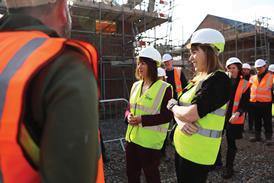HM Land Registry has urged its customers to provide all the information it requires to make the conveyancing process simpler, faster and cheaper - publishing a charter to help deliver its mission to protect and guarantee land and property rights.
The Registry said today that it wants to become the 'world's leading land registry for speed, simplicity and an open approach for data'.
In its charter, the registry commits to delivering changes and updates to the registers within its published service delivery times and to its accuracy standards. It will respond to queries 'promptly and professionally'. It will work with customers to 'improve our services continuously and drive innovation'. It will be provide 'secure, stable and highly available' services. It will be 'open and transparent' in its customer dealings, 'recognising our impartiality and treating our customers with respect'.
The registry expects customers to provide all the information it requires to make changes to the register when an application is made. Customers are expected to ensure they have verified relevant information and treat staff with respect.
The agency says the majority of its customers are often involved in the conveyancing process and 'we need to work together to make conveyancing simpler, faster and cheaper'.
In a blog post announcing the charter, Chris Pope, the registry's chief operations officer, says the registry will publish its call handling times on the gov.uk website. The Registry will also 'refresh the look, feel and functionality' of its portal so that access is 'more intuitive'. Simpler transactions will be automated.
Highlighting solutions to potential challenges, Pope says the registry will continue to work with customers to remove delays from the conveyancing process, such as those caused by the application enquiries (requisitions) that the registry needs to send to customers for additional information or clarification.
The registry has also published 13 key performance indicators for 2018 to 2019. Targets include reducing the average rate for requisitions (requests to applicants for further information) from 20% to 15%, reduce the previous year's target for the average cost per register update by 3% in real terms, complete register queries within two days, and complete register updates within five days. The registry's digital programme is expected to 'deliver a productivity saving' of 65 full-time equivalents by 31 March 2019. The local land charges service will be live and accessible by the end of this year.
Last week the registry announced it was partnering with a software company to explore the potential of blockchain technology as part of efforts to automate the conveyancing process.
The government said earlier this year that it wants to work with the conveyancing sector to develop digital signatures. improve the ID verification process and adopt e-conveyancing to improve the home buying and selling process.



























16 Readers' comments